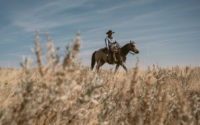Julie Byrne’s “Melting Grid”
When I first moved back to New York in the early, wintry days of 2018, I was nearly a year into working nights for Pitchfork. At the time, I was trying to support myself as a full-time music writer by cobbling together enough assignments on top of that steady work, but inevitably there’d be a day with nothing due or to do until I signed on at 5 p.m.
I didn’t exactly have the financial means to take advantage of the city’s innumerable happenings, so instead I spent my days going on long walks and listening to music. The days would start off emitting a kind of watery sunlight before low-hanging clouds overtook that open sky and pressed in close. It would’ve felt so cozy if it weren’t so frigid.

Walking became my pastime because walking was free. I’d take to the streets in search of escape from my small bedroom, losing myself in the albums that soundtracked those jaunts. One afternoon, I ventured over to Socrates Sculpture Park, in Astoria, at the exact moment folk musician Julie Byrne‘s “Melting Grid” streamed through my headphones.
The song opens with an acoustic guitar, conforming to the shape many a singer-songwriter takes, before it shifts, surprisingly, to a flute. It’s more than an instrumental change—the tempo itself adjusts. Where the track was once a steady, pacing heartbeat, it suddenly slows, as though following a long exhalation. I remember being almost instantly transfixed; I remember stopping in my tracks.
Byrne’s lyrics evoke an enigmatic scene. “Paper that’s quick to burn/ I’m the cinnamon peeler/ Beetles crushed that dye the carmine,” she sings, her voice arriving with a measured, sap-like luxuriousness. But it’s the last line that lingered in my mind, like a flume of smoke hanging in the air: “I exist to be dreaming still.” It’s a lyric so wholly self-assured it feels aspirational.
“Melting Grid” is an image-heavy reflection about an endeavor—or a relationship—that required a sacrifice Byrne grew uncomfortable making. “Would you ask my permission/ The next time you absorb me,” Byrne sings with the kind of cutting precision that precludes an answer. There’s no need for one because there won’t be a next time. Byrne’s a roamer, a natural rambler. Anything requiring her to forego her imagination asks too much.
It’s such a beautifully quiet song for the subtle strength it exudes. I hear that strength most potently in the line that first haunted me, “I exist to be dreaming still.” I remember what it felt like to walk in a sculpture park in Queens, New York, staring across the watery distance to Manhattan and dreaming: of the things I wanted to write and the places I wanted to go. They dangled out in front of me, like so many sparkling vistas.
That possibility—for what else is a dream—has felt especially foreign these past several months, but I’m ready for a new reverie. I’m awakening to what it once felt like and what it could be again.



